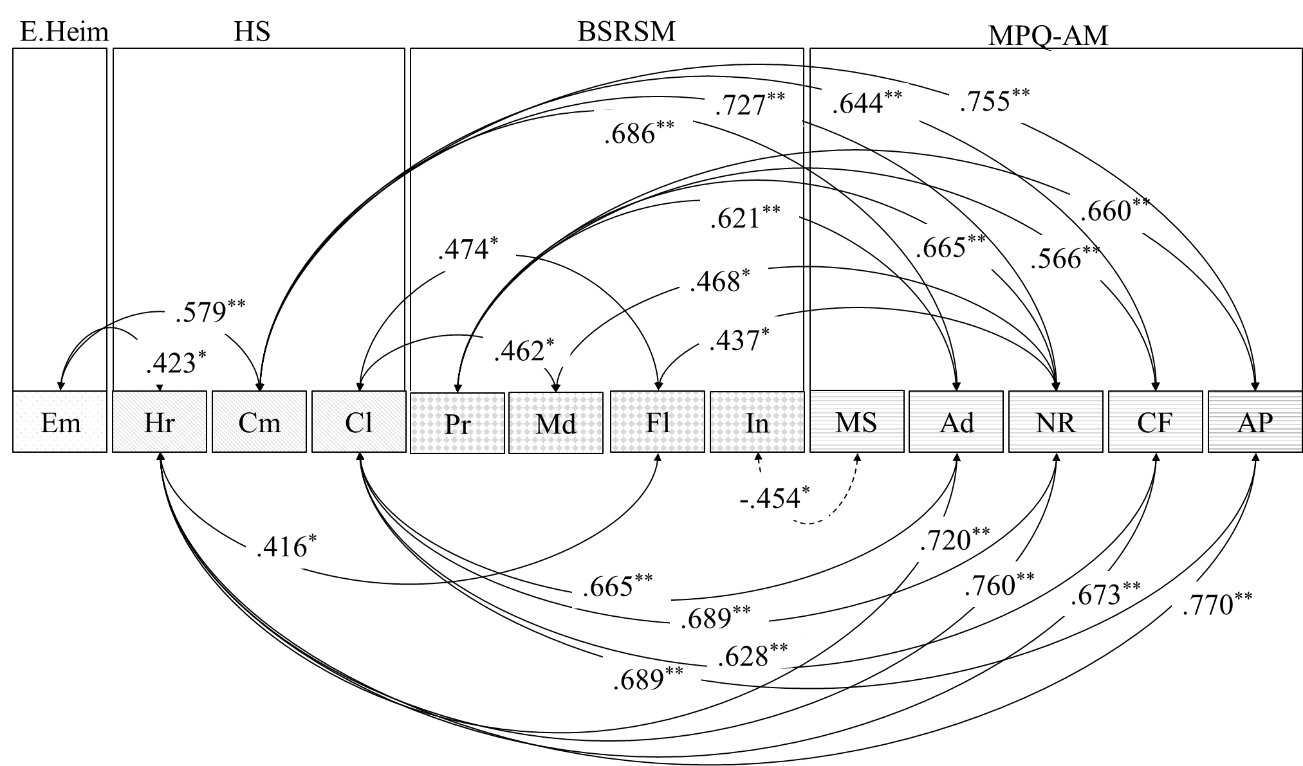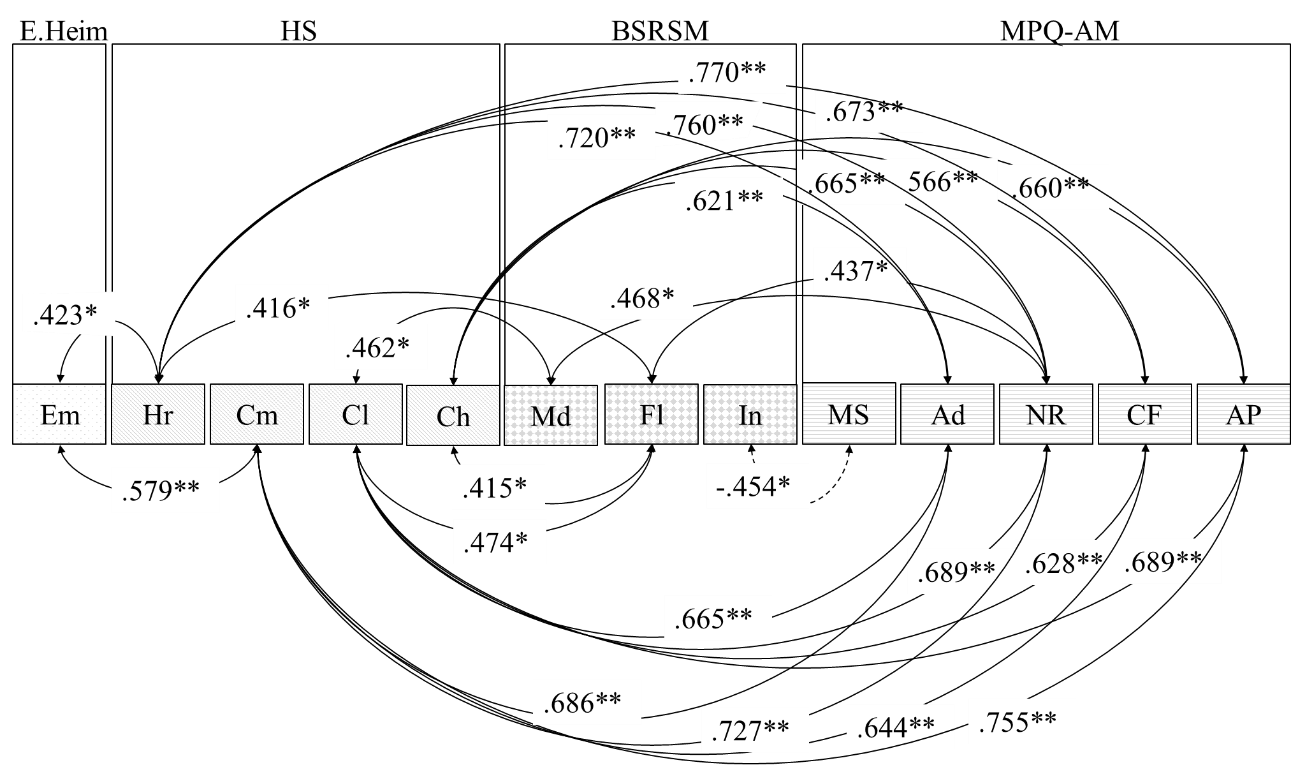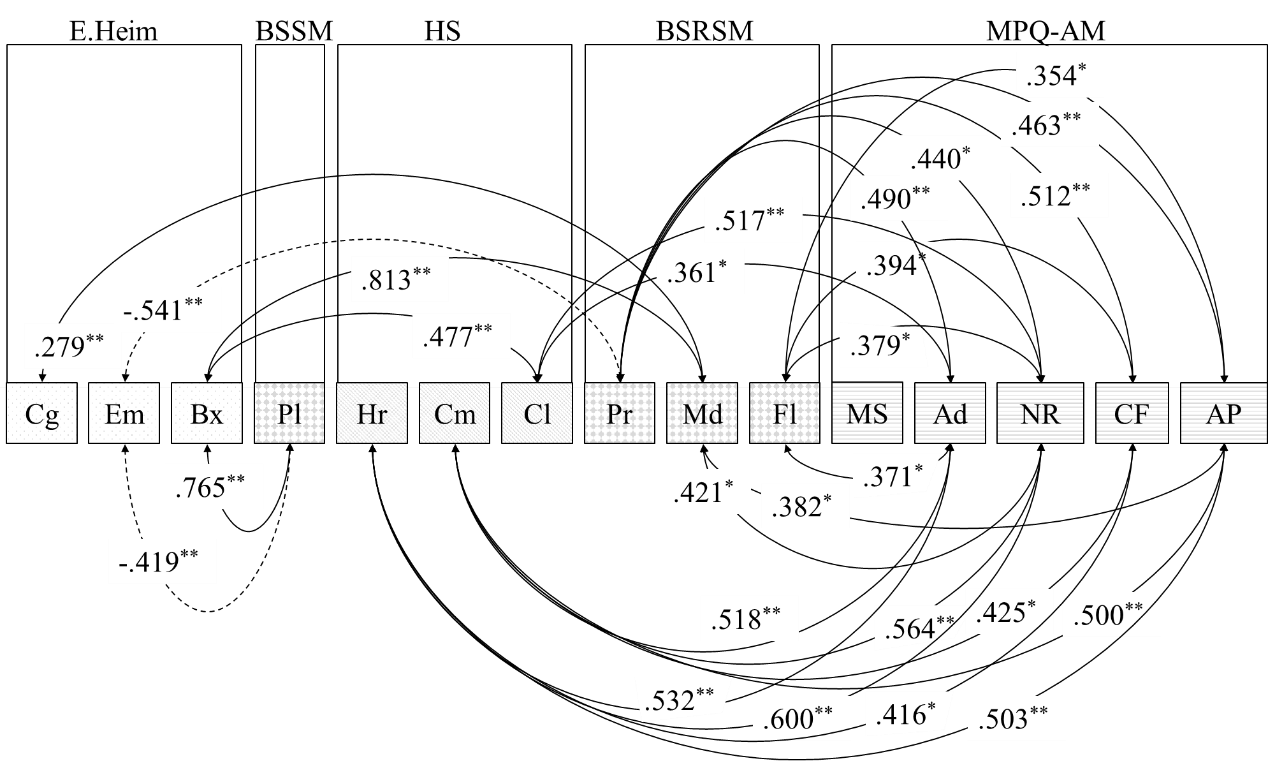Abstract
The article discusses the results of an empirical study of the hardiness of a person in a situation of mastering new types of professional activity. The respondents were students of the educational programs of the magistracy (qualification master) and undergraduate programs (qualification bachelor) and students of the professional retraining program. Hardiness is considered as a personal disposition, based on the willingness to productively cope with difficult life situations. Based on the use of correlation analysis, it is shown that individuals in a situation of mastering a new type of professional activity demonstrate a number of general properties of hardiness (involvement, control) regardless of age and gender characteristics, individual style of self-regulation (modeling, flexibility), adaptability and coping behavior ( preference for emotional coping mechanisms). Self-regulation is the process of programming and modeling activities, the manifestation of the properties of regulatory flexibility and independence sets the resource of hardiness. For students of the professional retraining program, the presence of established links between personality traits based on the adaptive resource, as well as the formation of psychological structures responsible for hardiness, and the use, mainly, of emotional coping mechanisms, are characteristic. Young people have not yet formed their preferences in the choice of coping mechanisms; they are ready to evaluate themselves and their results according to generally accepted criteria. The results can be demanded in the practice of employment services, personnel services of enterprises, in the educational process for the training of specialists.
Keywords: Hardinessself-regulationadaptabilitycopingprofessional activity
Introduction
In current conditions, professions disappear and appear with incredible speed earlier, and even those that continue to remain relevant are filled with new meaning and new tasks. Changes in the labor market and employee requirements under the influence of digitalization processes, the acceleration of the pace of life gives rise to unprecedented tension in all mental systems, forcing a person not only to adapt to changes but to act in advance of events.
In domestic and foreign psychological science, an attempt is increasingly being made to solve the problem of resistance to difficult life situations from the perspective of a holistic understanding of personal characteristics that affect successful adaptation and coping with all kinds of difficulties. The concept of personal adaptive potential is based on an understanding of the need to take into account the psychophysiological capabilities of the body. Prediction of activity, self-realization of the present with a future orientation affects to a higher degree the personal level, which is revealed in the works devoted to personal potential (Leontiev, 2016). Various aspects and manifestations of personal potential were studied in works on the regulation of behavior and activity (Bonanno & Burton, 2013; Morosanova & Konoz, 2000), individual differences in coping behavior (Van Berkel, 2009), and hardiness (Maddi et al., 2017). Scientific interest is increasingly focused on the level of an individual, which, however, does not negate the relevance of studying typical reactions of a person as a representative of a particular group of individuals (Banshchikova et al., 2018). At the same time, the need to maintain productivity is necessary not only in extreme situations, but also in conditions that, at first glance, are unremarkable, but presenting increased demands on the person. These include, for example, limited health, acculturation difficulties, professional crises. In the proposed study, we focused on the study of a relatively common situation of changing the type of professional activity, the need for which may arise suddenly, or be prepared by the purposeful activity of the person himself.
Problem Statement
Today, there is an absolute contradiction in science and practice related to the need to provide psychological and other professional assistance to people who are in a situation of changing types of professional activity. On the other hand, such a situation is repeatedly initiated by a person, striving for development in the profession, career, and personal growth. Modern society provides him with tools for the development of new types of professional activity in the form of various educational programs. From our point of view, the problem is to identify typical, recurring traits of individuals who seek not only to get an opportunity to earn money but to develop in order to overcome the difficulties that arise.
Research Questions
The subject of the study is the components of hardiness and related personal properties, manifested in the situation of mastering new types of professional activity.
Purpose of the Study
The purpose of the work is to study the manifestation characteristics of the individuals' hardiness in the process of mastering a new type of professional activity as students of a higher education program or students of the professional retraining program.
Research Methods
The study involved a total of 133 people studying under the programs of primary and additional professional education. These included 59 master's degree students, 28 trainee retraining students, and 36 undergraduate students; of these, 80 are males, 53 are females. The age of the subjects ranged from 20 to 43 years.
In the research process, standardized methods were used that have confirmation of constructive validity, and were repeatedly used in the research of Russian scientists (Banshchikova & Sokolovsky, 2019). The methods included: Hardiness test, adaptation of the test Maddi et al. (2017), performed by Leontiev (2016); Questionnaire "Style of self-regulation of the behavior of the SMTA" (BSRSM), developed under the guidance of Morosanova and Konoz (2000); Multilevel personality questionnaire "Adaptability" MLO-AM.
For analysis, the following parameters were used, which was designated on the measurement scales presented in the figures: "hardiness" (Hr), "commitment" (Cm), "control" (Cl), risk acceptance "challenge" (Ch) (Leontiev, 2016); "general level of self-regulation" (GS), "planning" (Pl), "modeling" (Md), "programming" (Pr), "evaluation of results" (ER), "flexibility" (Fl), "independence" (In) (Morosanova & Konoz, 2000); "adaptability, neuropsychic resistance" (NR), "communicative features" (CF), "moral normativity" (MS), "personal adaptive potential" (AP); "cognitive" (Cg), "emotional" (Em), "behavioral" (Bx) coping mechanisms (E. Heim). The processing and analysis of empirical research data were carried out using mathematical statistics methods using the IBM SPSS Statistics 22 and MsExcel 2016 software package. Pearson's correlation coefficient was used, which allows determining the presence of a linear relationship between two quantitative indicators, as well as to evaluate its tightness and statistical significance.
Findings
The correlation analysis showed the presence of similar manifestations in the profile of hardiness (Figure
All respondents, being in the process of mastering a new type of activity, show regulatory flexibility (Fl), are involved in modeling a promising future (Md) to realize educational information, and embed it in their ideas about future work.
All respondents, regardless of age and method of mastering a new professional activity for themselves, manifest their full adaptation ability. For their life situation, both neuropsychic resistance (NR), which is largely associated with the innate characteristics of the psyche, as well as communicative features (CF), expressed in establishing contacts with others, and orientation to generally accepted norms of behavior (MS), are significant. For all respondents, hardiness as a system of beliefs about themselves, about the world, about relations with the world is strictly positively associated with personal adaptive potential. A healthy type of psyche, stress tolerance, sociability, and the ability to limit oneself following moral requirements, of course, increase the overall level of hardiness of a person. On the other hand, successful communication involves not just resistance to stress, but counteraction to them without reducing productivity. For successful communication, the adoption of regulatory restrictions is necessary, which contributes to the neuropsychic balance.
For all study participants, emotional coping mechanisms (Em) turned out to be significant, which, however, among future bachelors introduce indignation (r = –0.541) into the processes of conscious self-regulation. Along with the general manifestations, specific features of hardiness were found in different groups of respondents. Master's degree students (Figure

Having decided on the prospects of professional development and career plans, master's degree students, in the majority, are set up for quite definite prospects. The absence of significant correlations with the "risk acceptance" scale (Ch) indicates this. They show the necessary activity in the struggle for the result, modeling possible situations (r = 0.462), flexibly changing their behavior (r = 0.474).
In the regulatory system, the representatives of this sample emphasized the programming process, which has positive relationships with all components of adaptability. This fact indicates the search for respondents of means to achieve the stated goal. By the time they receive higher education in the second stage, young people are resistant to changing the situation on the labor market, and quickly develop a strategy for their behavior. This level of education is often associated not only with a change in professional tasks but also with the development of a new profession.
The connections of the "commitment" scale (Cm) and "control" (Cl) with adaptability indicators testify to this. Control (Cl), in turn, extends not only to the desire to control external events but also to the internal space of the personality: the scale is positively associated with the indicators "modeling" (r = 0.462) and "flexibility" (r = 0.474).
The connection of "engagement" and emotional coping mechanisms (r = 0.579) indicates that master's degree students tend to delve deeply into the process, allowing themselves evaluating what is happening based on their criteria. Indirectly, this observation confirms the negative Correlation of "independence" and "moral normativity" (r = –0.454).
An analysis of the results demonstrated by the students of the supplementary program indicates their proximity to the characteristics of the sample of master's degree students (Figure
Hardiness in the group of students is supported by adaptive abilities (MS, Ad, NR, CF, AR), the modeling process (r = 0.462), and regulatory flexibility (r = 0.416). They, like master's degree students, tend to use emotional coping mechanisms, evaluate situations based on their criteria. The development of regulatory autonomy in them also negatively correlates with "moral normativity" (r =–0.454).

For students on a retraining program, the “programming” (Pr) scale in the profile does not have a significant indicator, in contrast to the master's degree students profile. Nevertheless, in general, scales and indicators have many common points of contact.
Unlike the first two, the profile of undergraduate students (qualification bachelor) is less structured (Figure
Analysis of the data indicates the absence of a risk acceptance indicator (Ch) among significant indicators of hardiness, which does not allow respondents considering life experience from a developmental perspective. Hardiness scales (Hr, Cm, Cl) positively correlate with adaptability scales (MS, Ad, NR, CF. AP), behavioral coping mechanisms (Bx). Respondents feel the need to have control over their lives, and therefore they have to change their attitudes (r = 0.477).
It is also possible to solve this problem by activating the sphere of conscious self-regulation, among the scales of which the largest, in comparison with two other samples, is the number of significant scales (Pl, Pr, Md, Fl). Unlike master's degree students and students of additional programs, undergraduate students in the vast majority do not have work experience. Therefore, the formation and retention of goals for undergraduate students is an independent task that activates the process of “planning” and a tendency to behavioral strategies of coping behavior (r = 0.765). A negative correlation was established between emotional coping, on the one hand, and planning processes (r = –0.419) and programming (r = –0.541), on the other. The presence of this type of connection indicates that the personal system of productive coping with stressful situations only develops in the process of the initial mastery of the profession.
The developed ability to assess significant external and internal conditions (“modeling,” Md) activates the appeal to cognitive mechanisms of coping with stress (r = 0.279). Thus, the whole coping mechanisms range is involved in the hardiness system and coping in the situation of the initial mastery of the profession.
Despite the activity of regulatory processes, it can be argued that autonomy in goal-setting and goal-attainment has not been formed, since “independence” (In) has not manifested itself among significant indicators.

An analysis of the data of respondents who are first mastering the profession shows that their level of hardiness is primarily supported by the efforts of the adaptation system and the system of conscious self-regulation when using the entire spectrum of coping mechanisms.
Conclusion
The study allows drawing some conclusions.
Mastering a new type of professional activity as a prerequisite for changing the vector of professional development leads to the actualization of the components of hardiness, adaptability, self-regulation, and coping behavior.
Persons mastering new activities demonstrate various manifestations of the components of hardiness, taking into account the choice of training in basic and additional educational programs. Students who choose long-term educational programs (master's degree and undergraduate programs) are not always inclined to consider the acquired experience and knowledge as developing and enriching, which reduces hardiness. At the same time, we are inclined to consider the choice of programs at the master's level as more conscious due to the experience gained and professional tests made.
The training period requires conscious self-regulation of behavior and activity, primarily in the aspect of thinking through steps to achieve the goal, assessing significant external and internal conditions and the ability to make changes to the program of action. These competencies correspond to the development of regulatory processes of programming and modeling and the regulatory property of flexibility.
One of the essential hardiness resources during the development of a new type of professional activity is the individual's ability to actively adapt to life changes, however, in the absence of the stated goal of professional development, the load on the individual's adaptive potential increases. For undergraduate students as the first to master the profession, the task of retaining and correcting goals and developing the regulatory planning process remains relevant.
Students who are mastering a new professional activity in the retraining format are distinguished by their willingness to consider any experience as a useful source of knowledge, which harmonizes their profile of hardiness. Like magistracy students, they have developed methods of coping, tend to get involved in the development of new activities, demonstrate emotional coping mechanisms. A distinctive feature of students who are mastering a new professional activity is the ability to evaluate the results of their activities according to their criteria, which makes them more independent, but also possibly less loyal employees in future.
The results can be demanded in the practice of employment services, personnel services of enterprises, in the educational process for the training of specialistsю
Acknowledgments
The reported study was funded by RFBR, project number 19-013-00308.
References
- Banshchikova, T. N., & Sokolovsky, M. L. (2019). The role of regulatory and personal dispositions in a situation of changing types of professional activity. Int. J. of Experim. Ed., 5, 26–30.
- Banshchikova, Т., Fomina, Е., Solomonov, D., & Solomonov, V. (2018). Using neural networks in building a psychological typology. In Proceedings of REMS 2018 Russian Federation & Europe Multidisciplinary Symposium on Computer Science and ICT. Dombay. http://ceur-ws.org/Vol-2254/
- Bonanno, G. A., & Burton, C. L. (2013). Regulatory Flexibility: An Individual Differences Perspective on Coping and Emotion Regulation. Perspect. on Psycholog. Sci., 8(6), 591–612.
- Leontiev, D. A. (2016). Self-regulation, resources, and personal potential. Siber. Psycholog. J., 62, 18–37.
- Maddi, S., Matthews, M., Kelly, D. Villarreal, B., Gundersen, K., & Savino, S. (2017). The Continuing Role of Hardiness and Grit on Performance and Retention in West Point Cadets. Military Psychol., 29. https://doi.org/10.1037/mil0000145
- Morosanova, V. I., & Konoz, E. M. (2000). Style self-regulation of human behavior. Psychol., 2, 118–127.
- Van Berkel, H. (2009). The relationship between personality, coping styles and stress, anxiety and depression. University of Canterbury.
Copyright information

This work is licensed under a Creative Commons Attribution-NonCommercial-NoDerivatives 4.0 International License.
About this article
Publication Date
31 October 2020
Article Doi
eBook ISBN
978-1-80296-091-4
Publisher
European Publisher
Volume
92
Print ISBN (optional)
-
Edition Number
1st Edition
Pages
1-3929
Subjects
Sociolinguistics, linguistics, semantics, discourse analysis, translation, interpretation
Cite this article as:
Fomina, E. A., & Solomonov, V. A. (2020). Features Of Personal Vitality Manifestation In New Type Of Professional Activity Development. In D. K. Bataev (Ed.), Social and Cultural Transformations in the Context of Modern Globalism» Dedicated to the 80th Anniversary of Turkayev Hassan Vakhitovich, vol 92. European Proceedings of Social and Behavioural Sciences (pp. 366-373). European Publisher. https://doi.org/10.15405/epsbs.2020.10.05.48

